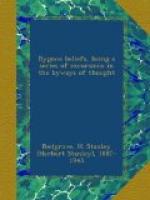On the other hand, ROGER BACON has often been maligned for his beliefs in astrology and alchemy, but, as the late Dr BRIDGES (who was quite sceptical of the claims of both) pointed out, not to have believed in them in BACON’S day would have been rather an evidence of mental weakness than otherwise. What relevant facts were known supported alchemical and astrological hypotheses. Astrology, Dr BRIDGES writes, “conformed to the first law of Comte’s philosophia prima, as being the best hypothesis of which ascertained phenomena admitted."[1] And in his alchemical speculations BACON was much in advance of his contemporaries, and stated problems which are amongst those of modern chemistry.
[1] Op. cit., p.84.
ROGER BACON’S greatness does not lie in the fact that he discovered gunpowder, nor in the further fact that his speculations have been validated by other men. His greatness lies in his secure grip of scientific method as a combination of mathematical reasoning and experiment. Men before him had experimented, but none seemed to have realised the importance of the experimental method. Nor was he, of course, by any means the first mathematician—there was a long line of Greek and Arabian mathematicians behind him, men whose knowledge of the science was in many cases much greater than his—or the most learned mathematician of his day; but none realised the importance of mathematics as an organon of scientific research as he did; and he was assuredly the priest who joined mathematics to experiment in the bonds of sacred matrimony. We must not, indeed, look for precise rules of inductive reasoning in the works of this pioneer writer on scientific method. Nor do we find really satisfactory rules of induction even in the works of FRANCIS BACON. Moreover, the latter despised mathematics, and it was not until in quite recent years that the scientific world came to realise that ROGER’S method is the more fruitful—witness the modern revolution in chemistry produced by the adoption of mathematical methods.
ROGER BACON, it may be said, was many centuries in advance of his time; but it is equally true that he was the child of his time; this may account for his defects judged by modern standards. He owed not a little to his contemporaries: for his knowledge and high estimate of philosophy he was largely indebted to his Oxford master GROSSETESTE (c. 1175-1253), whilst PETER PEREGRINUS, his friend at Paris, fostered his love of experiment, and the Arab mathematicians, whose works he knew, inclined his mind to mathematical studies. He was violently opposed to the scholastic views current in Paris at his time, and attacked great thinkers like THOMAS AQUINAS (c. 1225-1274) and ALBERTUS MAGNUS (1193-1280), as well as obscurantists, such as ALEXANDER of HALES (ob. 1245). But he himself was a scholastic philosopher, though of no servile type, taking part in scholastic arguments.




